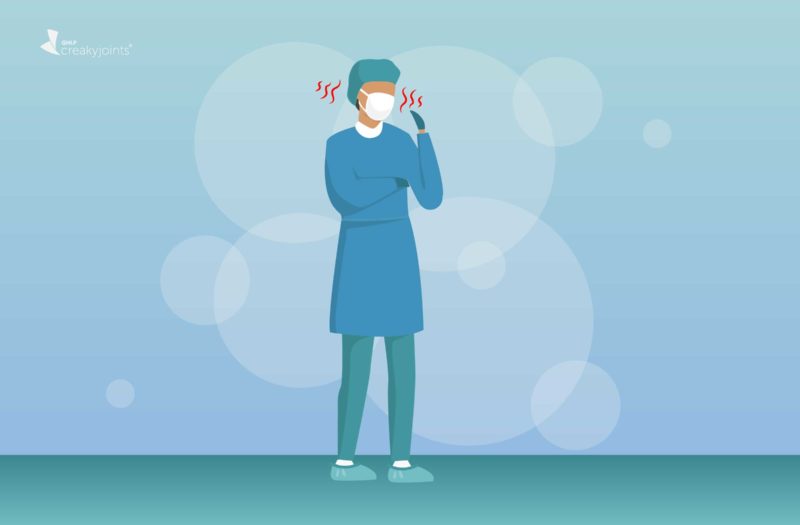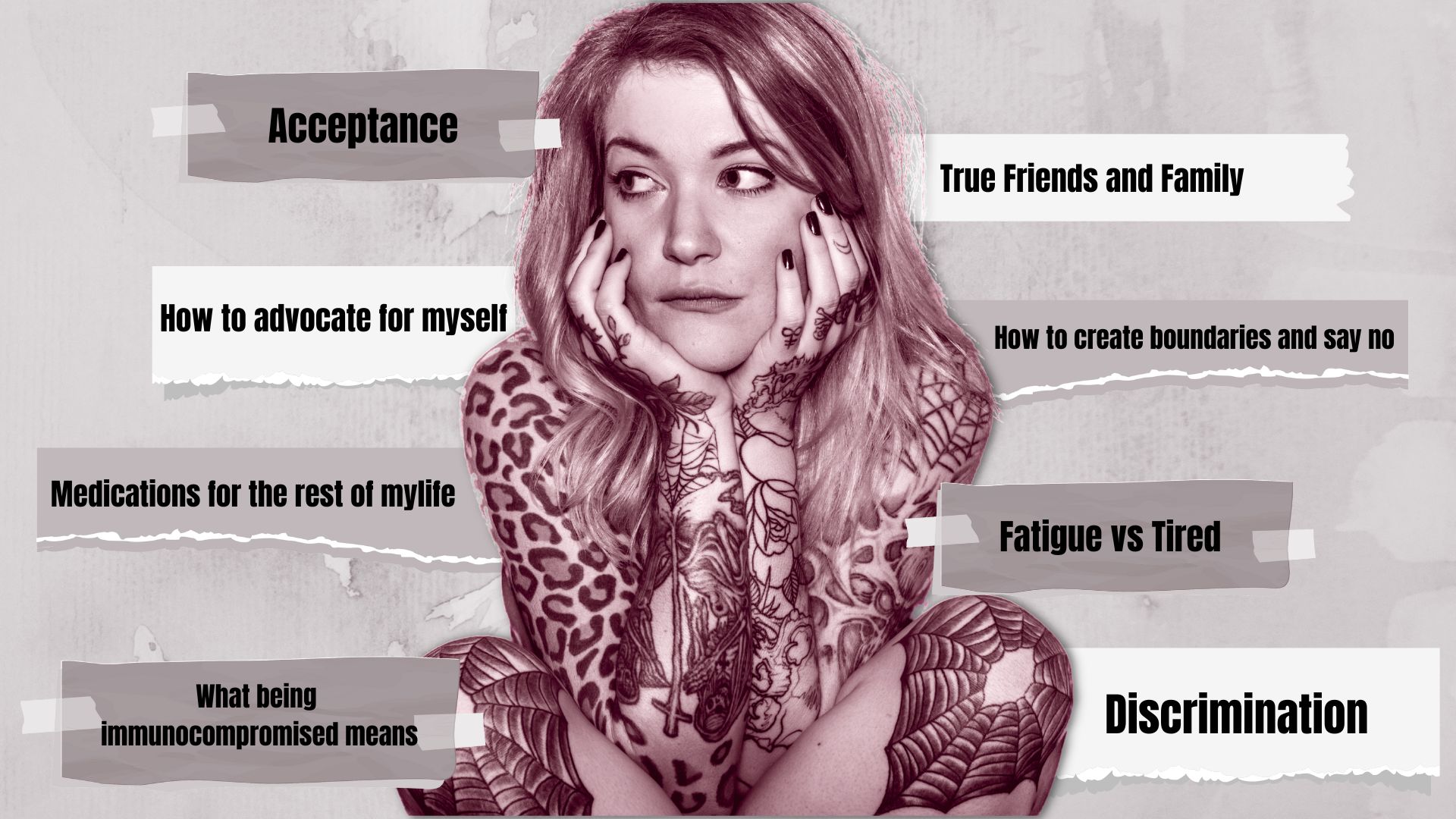Learn more about our FREE COVID-19 Patient Support Program for chronic illness patients and their loved ones.
I recently had the chance to speak with a friend and fellow rheumatoid arthritis patient about her ordeal battling COVID-19. As a health care worker in Oregon, she was especially high risk because of her likelihood of exposure and of complications. Here is the story she shared with me.
***
I’m a 51-year-old rheumatoid arthritis patient, diagnosed four years ago. I’m single and take care of all my medical needs. I’m also a health care worker involved with direct patient care. We started to hear things about COVID-19 in our work emails around the first of March. Someone from the hospital administration came to all the units and spoke about some changes that may occur. To be honest, we weren’t really concerned at the time. We work with terrible viruses and bacteria every day. (Think: staph infections that eat all your tissue to the bone — and are contagious.)
During that first week we also got our first COVID-19 ICU patient. I did not take care of that patient or go to that unit.
I started to develop what I suspected were COVID symptoms on March 11. Two days later, on Friday the 13th, I called occupational health to find out what my responsibilities were as far as reporting. They told me to come in and get tested. They had everything set up and ready to go when I arrived. They swabbed me for the flu and COVID-19; I was done in less than 10 minutes.
A few hours later I got a call saying that I was flu negative and that when my coronavirus results came in I would receive an email saying negative or I would get a call if it were positive.
I got a call two weeks later. That’s all I want to say about that.
What COVID-19 Symptoms Felt Like for Me
The first day of symptoms I was more tired than usual and I had a pounding headache and face ache. Headaches — and certainly not face aches — are not part of my usual RA journey. I just knew it had to be coronavirus. The next day I called in sick to work. I stayed in bed all day, my body hurting from head to toe. I was more swollen and painful than I ever have been. I did not take my temperature until I woke up on that third day. I was 100.2 degrees F. That’s when I made the call to occupational health. My dear friend came and drove me over. I needed help just to get down the stairs. I could not have done it alone.
‘As Bad as I Could Stand’
The next five days were about as bad as I could stand without going to the hospital. And I’m obviously more sophisticated than the average person about medical symptoms and what to ask my doctor for to help me manage my symptoms.
The first thing I asked for was a steroid inhaler and bronchodilators (medications that open your airway to make breathing easier). I had a dry painful cough. QVAR was the inhaled steroid prescribed. I found that it helped more than albuterol, the bronchodilator. I used both twice a day and the albuterol for acute shortness of breath. I was very short of breath, even at rest. My fever was still around 100 degrees F this entire time.
Around this time I also became very dehydrated and was just not able to maintain fluid intake. This was also contributing to my headache and severe malaise. Thankfully, I have an amazing friend who gowned/gloved/masked up and came into my apartment to help me. Once she got the catheter in, I could hook up the fluids on my own. I did this because I didn’t want to go to the ER and possibly infect numerous people. (Obviously not everyone has a nurse friend who would do that — but this is how my story played out.)
I continued to have a fever and sweats/chills for the next several days. I slept probably 16 to 18 hours a day. I was not eating, just trying to drink. During these five days I hung 3 liters of fluids. I would sleep all day and wake up dehydrated. I continued taking all of my RA medication including my biologic and methotrexate. I started myself on 10 mg of prednisone, which didn’t help — I remained swollen and extremely painful.
A NOTE FROM CREAKYJOINTS: You should consult with your health care provider about your medications if you develop symptoms of infection, including those of COVID-19. Some providers recommend that patients stop taking immune-suppressing medication during an infection, but this should be made on a case-by-case basis and individualized for you.
Every day I had a telemedicine appointment with my family doctor. She would watch me take my temperature and I would tell her my symptoms. There wasn’t a lot she could do for me but it helped to talk with someone and it made me feel less alone.
Those appointments were as important to me as any medication.
I was also in close contact with my RA doctor. I had been planning to start a new infusion on the April 8 and there was a lot of discussion about waiting to change. I had a bad flare in November for which I was hospitalized for a week. Ever since my baseline “normal” has changed. My fucking fingers are popping out of socket a few times a day. I told her no way. I’m getting my new medication. Full speed ahead.
The second week of being sick was like riding a wave. I would feel great for a few hours and then just hit the wall. Suddenly. I would feel hungry, eat, throw up, repeat.
Planning for Re-Entry
Like many people with inflammatory arthritis, I’m using to living a quarantine-esque lifestyle. Plus, I’m an extroverted introvert. This means I can handle people for a certain amount of time and then I have to bury myself. My job requires me to be very “on,” so once I am finished with my shifts I’m rarely around people until it is time to go back to work. My tribe is very small and they understand me.
On April 3, I was given permission to go out again based on guidelines for the resolution of symptoms. But I didn’t leave my apartment for another two full days, partly because I had everything I needed, but mostly because I was — and still am — scared.
I’m scared of still unknowingly spreading it. I’m scared of being out and suddenly being unable to breathe. I’m scared of excruciating pain if I go out and push my body too much.
I’m scheduled to go back to work in the middle of April. So for the next 10 days my focus will be my new medication and on getting my strength back. I’m ready to get into the fight against this mother#^@%*&.
My co-workers are struggling with the weight of this pandemic. I want to help them. This is what I train for. This is what we do.
The reason Eileen Davidson asked me to share my story is to tell you that this virus doesn’t have to mean a death sentence for autoimmune patients. You can get sick and still be ok. There will be days where you won’t feel like it and call me a liar but I swear you can do it. I’m on every RA medication and I spend half my life dealing with some health issue. I’m just like you.
The advice that I would give right now to anyone who is immunocompromised and still healthy is this: Set up your home as if you know you are going to get sick. Make a plan with friends and family to get what you need while keeping everyone safe. I was not ready for a two-week-long quarantine and my friends and family had to do a lot to get me settled. I realize a lot of these items are difficult or impossible to find right now, but try hard to acquire what you can while you are healthy.
- OTC fever reducers
- Thermometer
- Finger pulse oximeter
- Mattress cover (for sweating)
- Lots of clean linens (sweating)
- Lots of clean comfortable PJs
- Pedialyte, Gatorade, or any kind of electrolyte replacement
- Bland soups and teas
- Air purifier
- Humidifier (helps with cough)
Make everything very accessible to where you feel like you will be resting the most.
Find out if your doctor has access to telemedicine and set it up. This is also a good time to discuss with all your doctors what your game plan is, should you get sick, and make sure they are on board.
Even if you have to wait a bit to have supplies delivered, get them anyway.
If you have pets, stock up on what they need and make a plan if you decide it will be too hard to care for them. For me, they were a godsend and caring for them made me forget myself for a few minutes.
I’m not going to say “don’t worry, everything will be OK” because I don’t know shit. I just know that if I can get COVID-19 and survive, you can too.
Get Free Coronavirus Support for Chronic Illness Patients
Join the Global Healthy Living Foundation’s free COVID-19 Support Program for chronic illness patients and their families. We will be providing updated information, community support, and other resources tailored specifically to your health and safety. Join now.






